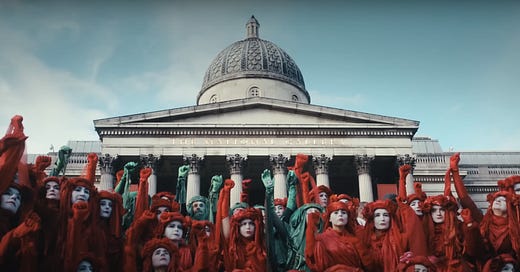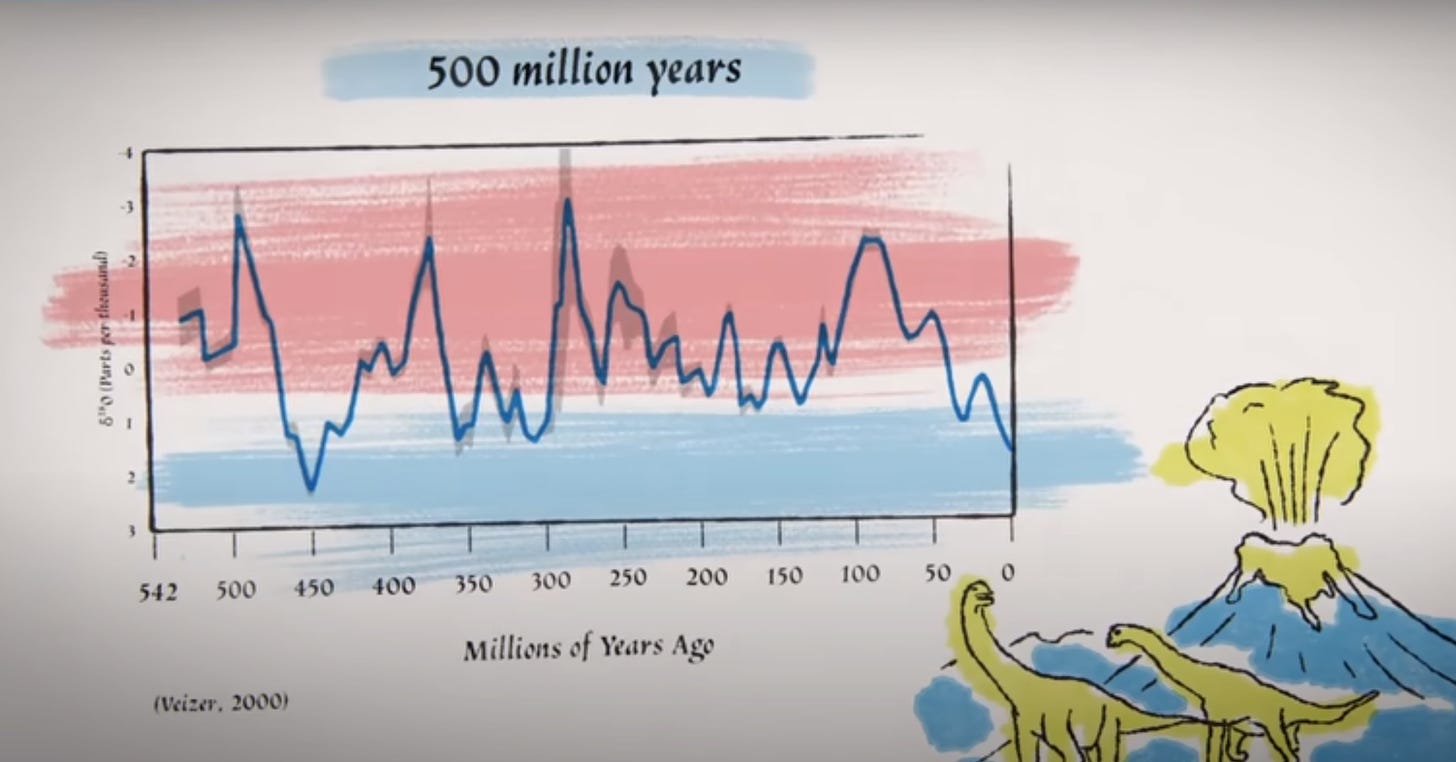As you may have seen circulating the interwebs, Martin Durkin’s latest film Climate: The Movie (The Cold Truth) is receiving praise from those who challenge the climate crisis narrative. You can watch the 80-minute flick here:
My Two Cents
This film opens with a bunch of credentialed individuals challenging the evidence behind the claim of a climate crisis. It is made clear that science—regardless of topic—is never settled. Stating this position up front is a strong choice, but the film quickly gets messy.
By the 6:29 mark, the film’s narrator states,
These very eminent and respected scientists, and others like them, are not flat Earthers. They do not deny science. So, what’s the evidence that has caused them to dismiss the climate alarm as nonsense?
I thought the science was never settled? Why drag in the debate between the popular heliocentric model and the flat Earth model? Why use it to belittle others when the subjects in this movie have already been victims of mainstream science themselves? It’s unfortunate that the filmmaker decided to drive head-on into a wall of hypocrisy.
At 8:50, the narrator continues,
For 200,000,000 years, dinosaurs roamed the Earth…
…And at no time during those 200,000,000 years were the temperatures as cold as they are today.
Dinosaurs roamed the Earth? If they even existed at all, why are we so sure about this timeline? The filmmaker clearly hasn’t done any research on this topic, but decides to throw it in there for what could only be contextual purposes since mainstream education indoctrinates children with this mythology. Also, how does one measure temperatures from 200 million years ago?!? If you go down this path, you need to do a deep dive into the methods used to come up with these claims. The film merely skims the surface.
Shortly after, physicist Steven Koonin says,
If you go back—let’s say—200,000,000 years, it was maybe 13 degrees warmer than it is now. So, on the geological perspective, this is not at all unprecedented.
It was maybe 13 degrees warmer? Maybe?!? We’re debating today’s temperatures with maybes from hundreds of millions of years ago?!?
Back to the narrator who states,
For the last 500,000,000 years, temperatures have varied greatly. But for almost all that time, the Earth was much, much warmer than today. Compared to the last half billion years, the Earth right now is exceptionally cold. In fact, there are very few times when it’s been this cold.
This seems to directly contradict what was stated just a couple minutes earlier. Was there other cool periods or not? The image on the screen actually cites (in small text) a 2000 study by Ján Veizer et al. to go with this claim. The paper is titled Evidence for decoupling of atmospheric CO2 and global climate during the Phanerozoic eon. Several of the scientists in the film go on to mention carbon dioxide levels follow rises in temperature and not the other way around as purported by climate alarmists.
Geologist Dr. Matthew Wielicki contributes,
We are in a remarkably cool period if we look over the last 550,000,000 years. In fact, only one other time period in the last 550,000,000 years was the temperature as cool as it is now.
Okay, so it was just one time…I guess? Science just seems to be one big guessing game no matter which end of the table you sit at. Wielicki mentions the extinction of dinosaurs (umm…okay?) leading to our “evolutionary ancestors” living on the land. The theory of evolution was just casually slipped in there to challenge the climate crisis. Interesting.
Around 15:00, things start to get good. They discuss how some instruments used to today are reading significantly higher temperatures because they are more likely to be found in recently developed areas with lots of concrete that retain heat. As soon as you go to rural areas (or even the ocean) the increase in temperatures over the last several decades isn’t very impressive.
At 25:30, physicist Will Happer challenges the carbon dioxide narrative and refers to petroleum products as fossil fuels. If you’ve done research on the topic, you know that these fuels do not come from fossils. John D. Rockefeller controlled not only that industry, but also education which pushed this term in textbooks. Why? Maybe it was to promote the idea of oil being a scarce resource? Happer wasn’t the only person in the film to use this term, so it shows you that even “experts” use incorrect terminology when presenting their arguments.
At around 33:00, the scientists in this third chapter discuss how clouds impact temperature far more than carbon dioxide levels. Some of them study how alleged exploding stars millions of miles away are creating clouds here. This topic really needs its own deep dive, as these claims seem to be farfetched.
It’s interesting that not a single person mentions geoengineering or cloud seeding programs that create a haze in the sky. Many who have studied this topic believe that heat from the sun penetrates our atmosphere during the day, but, when that heat goes to rise at night, it gets trapped. So, if some nights seem to be unusually warm when compared to the historical record, that may very well be the culprit.
The fourth chapter focuses on extreme weather events. Jumping to about 37:20, they show data that suggests there were much more intense heat waves in the 1930s. Apparently, temperatures surpassed 110° F in the Dakotas and Wisconsin. Does that happen today?
There is no discussion, however, on weather modification programs. As “climate deniers,” one would think some of them would have explored this topic by now. Because there is also no discussion of geoengineering, no one mentions the increase of metal nanoparticulates that lead to more fires in certain parts of the world. Even still, there were many more fires recorded in the United States back in the 1930s.
The end of the film discusses climate funding through academia and, finally, the social movement behind climate. This might be the most fascinating part of the film, as shunned academics open up about their mistreatment. If you don’t believe in climate change, you don’t get money. There is no money in scientically challenging the narrative—you simply get denied. This is where mainstream science quickly turns into religion.
The climate activists are supposed to be mad at the big, bad government. However, this theatrical political pressure (which one should assume is funded by hidden dark money or blatant contributions from the corrupt) benefits the Al Gores of the world and the empire they serve. The demands of these movements call for more governmental control. People are so blinded by this proprosed existential threat, they don’t even see how this plays right into the hands of tyrants.
If human activity and consumption = imminent danger, then:
Restriction of movement = good
Mass surveillance = good
Police state = good
15-minute cities = good
Using programmable CBDCs = good
Eating bugs = good
A diverse, one-world government = good
A person would have to really believe in climate catastrophe to want that. Maybe they simply have no clue that all of these things are being implemented at this very moment and surely not because of any protests.
Who was this film made for?
If, like me, you have been down many rabbit holes, this film probably isn’t for you. Don’t get me wrong—some parts are great. I think the anti-flat Earth sentiment and early references to dinosaurs and evolution are meant to pull in people who have been indoctrinated by mainstream science. So, even if this moves the needle on the public’s opinion about climate change, it’s reinforcing other unproven ideas as “settled science”…which is the problem this documentary was created to highlight in the first place.
The cycle continues.
The war rages on.






My problem with the film doesn't require your level of fisking. I hate the partisan spin at the end. I'm also with you on the exception taken to trying to solve one problem by making another worse.
Basically western civ has proven it can't make intelligent decisions. Humans are smart, but the system we've made isn't. Sadly, I think we moved away from monarchy too quickly. Simply amplifying one mind would have been better than this mindless paperclip maximizer.
Timely observations. I was wavering on whether to carve out time tonight to watch this doc. It sounds like a work that will do more good than harm, but I don't anticipate much in the way of revelations. So I'll give it a chance but ... there will be fast-forwarding!